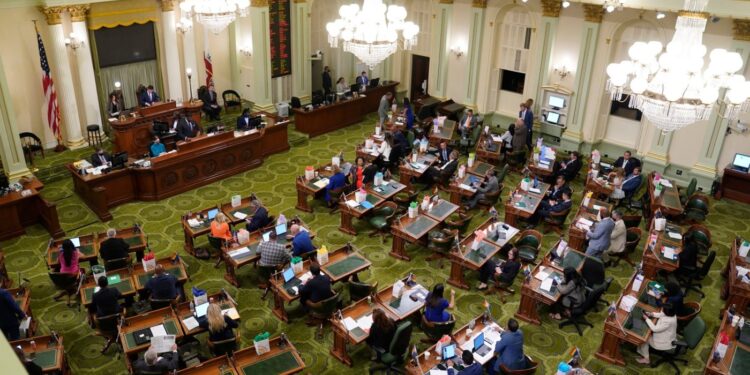
The final week of any legislative session typically descends into chaos, and in a state as large as California, that statement is doubly true. Nevertheless, basic procedural rules and constitutional requirements should guard against the worst abuses by power-hungry tyrants desperate to achieve their agenda before the clock runs out. Unfortunately, Saturday, August 31st, proved that even those protections aren’t enough to stop Democrats in our State Assembly.
It’s no secret that Republicans in California politics are essentially beholden to the whims of the supermajority Democrat party, lacking the votes to pass any legislation on their own. Democrats, holding 62 out of 80 seats in the Assembly and 31 out of 40 seats in the Senate, wield near-unchecked power, and they don’t hesitate to use it to their advantage.
Despite having over a hundred bills left to consider on the final day of the 2023-2024 Legislative Session, Assembly Democrats set a leisurely 2 PM start time for Saturday’s session, further cutting into an already tight schedule. Even then, they found ample time to pose for photos and scroll through their phones as the clock ticked down.
Unfortunately, this is business as usual in the Assembly. But last Saturday’s session took Democratic authoritarianism to a new extreme. With less than an hour before midnight, Assembly Majority Leader Cecilia Aguiar-Curry moved to suspend Assembly Rule 108, which dictates how long a member may speak on a bill. With one motion, the Democrats replaced the usual five-minute speech limit with a shocking new rule—30 seconds per member, per bill. That’s not a typo—30 seconds of debate on some of the most controversial legislation that could fundamentally alter the world’s fifth-largest economy and affect nearly 40 million Californians.
This undemocratic decision was the product of a lazy, unproductive Legislature that had procrastinated until the last moments of a two-year session to attempt to pass dozens of complex and disastrous policies.
At the start of each legislative session, the Assembly and Senate Rules Committees, in collaboration with Democratic leadership, establish standing and joint rules. These rules dictate the legislative process, covering everything from bill introduction deadlines to decorum on the Floor. Once adopted, they govern all legislative proceedings. However, most of these rules can be suspended with a two-thirds vote, a threshold the Democrat supermajority easily surpasses. As a result, the rules often feel more like suggestions, frequently waived by Democrats to bypass notice and deadline requirements not enshrined in the California Constitution.
When I rose to challenge blatant disregard for procedures, the Assembly Speaker Pro Tem tried to ignore me. When I was finally recognized, I pointed out that while the Assembly cansuspend a rule, it cannot create a new 30-second limit on debate in a single motion. The Speaker Pro Tem dismissed my point of order, stating it was “not well taken.” After consulting with his Floor staff, he then declared, “Mr. Essayli, you were using dilatory tactics, which are a violation of the rules. I will no longer recognize you after this.”
The message was clear: I was, for all intents and purposes, no longer a member of the Assembly, and the 478,000 Californians I represent were now voiceless—all because I dared to question the undemocratic actions of the self-proclaimed defenders of democracy. Sit down, shut up, and vote as you like, but we will do what we want with no regard for rules, civility, or respect. Any others who followed my lead would face the same silencing. At that point, the Assembly resembled the Soviet Politburo more than an American legislative body.
While a handful of Democratic leaders made this authoritarian decision, not one Assembly Democrat spoke up for democracy or the rights of legislators representing their districts. Either they agreed with the anti-speech ruling, or they were too afraid to challenge their leadership.
When People ask why the Golden State is in decline—why we face multi-billion-dollar budget deficits, a homeless crisis, a collapsing insurance market, and a never-ending crime wave—look no further than how this Legislature operates under one-party rule. This is how critical issues are handled and resolved.
Of the close to 40 million Californians, very few ever visit the Capitol or witness a legislative session. Our schools teach the textbook version of “how a bill becomes law,” but that’s far from reality. I urge the People of California to take a hard look at the authoritarian leadership running this state. California citizens need to see firsthand how the Capitol operates and decide if this is what we want for our state.
Can we truly have a government of the People when only 30 seconds is allotted to debate major bills? Do we still have a representative democracy when the supermajority cuts off the microphones of the minority? We answer these questions on November 5. Vote like your life, liberty and happiness depend on it, because in California, it does.
Bill Essayli was elected in 2022 to represent the 63rd State Assembly District, which includes the whole cities of Norco, Menifee, Lake Elsinore, and Canyon Lake, as well as portions of the cities of Eastvale, Riverside, and Corona. Assemblyman Essayli is a former federal prosecutor and Riverside County Deputy District Attorney. He is also a small business owner as partner at the estate planning law firm of Essayli & Brown LLP.







